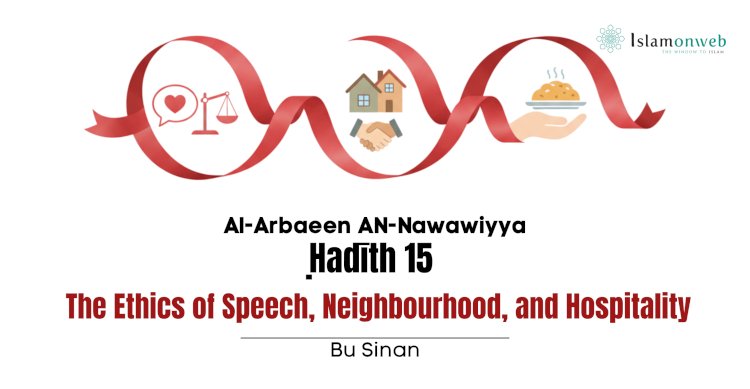Ḥadīth 15 :The Ethics of Speech, Neighbourhood, and Hospitality
عَنْ أَبِي هُرَيْرَةَ رَضِيَ اللّٰهُ عَنْهُ، عَن رَسُولِ اللّٰهِ صَلَّى اللّٰهُ عَلَيْهِ وَسَلَّمَ قَالَ:
«مَنْ كَانَ يُؤْمِنُ بِاللّٰهِ وَالْيَوْمِ الْآخِرِ فَلْيَقُلْ خَيْرًا أَوْ لِيَصْمُتْ، وَمَنْ كَانَ يُؤْمِنُ بِاللّٰهِ وَالْيَوْمِ الْآخِرِ فَلْيُكْرِمْ جَارَهُ، وَمَنْ كَانَ يُؤْمِنُ بِاللّٰهِ وَالْيَوْمِ الْآخِرِ فَلْيُكْرِمْ ضَيْفَهُ»
رَوَاهُ البُخَارِيُّ وَمُسْلِمٌ.
Translation
On the authority of Abū Hurayrah (raḍiyallāhu ʿanhu), the Messenger of Allah (ṣallallāhu ʿalayhi wa-sallam) said:
“Whoever believes in Allah and the Last Day, let him speak what is good or remain silent.
And whoever believes in Allah and the Last Day, let him honour his neighbour.
And whoever believes in Allah and the Last Day, let him honour his guest.”
Narrated by al-Bukhārī and Muslim[1].
Introduction
This concise yet insightful ḥadīth gathers three luminous traits that reflect the completion of īmān in a believer: purity of speech, honouring the neighbour, and dignifying the guest. When the Prophet ﷺ begins with the phrase “Whoever believes in Allah and the Last Day”, he is not speaking about the basic belief that enters one into Islam, but about the complete, refined īmān, the kind that saves one from Allah’s punishment and leads to His pleasure.
Classical scholars explain that this construction resembles a parent addressing his child: “If you are truly my son, obey me.” Not because disobedience removes lineage, but because such phrasing stirs the heart, awakens the sense of duty, and urges the listener to rise to the noble standard expected of him. In the same way, the Prophet ﷺ uses this style to ignite the believer’s resolve to practise these three ethical commands: speech that is good, kindness to neighbours, and generosity to guests.
The Prophet ﷺ also specifically mentions belief in the Last Day, the Day when every word and deed will be weighed, every kindness remembered, and every harm accounted for. By invoking the Hereafter, he reminds the believer that these actions are not casual social niceties, but behaviours tied directly to one’s eternal outcome. It is a gentle but powerful call: If you truly live with the awareness of standing before Allah tomorrow, let that awareness shape how you speak and how you treat the people around you today.
Thus, this ḥadīth serves as a roadmap for refining the inner self, elevating our interactions, and embodying the character of a believer whose faith radiates through his tongue, his home, and his hospitality.
“Speak Good or Remain Silent”
The Prophet ﷺ begins with the most personal and the most dangerous companion we carry everywhere: our tongue. Imām al-Shāfiʿī (raḥimahullāh) beautifully summarised the rule of this command:
“Before you speak, think.
If you are sure that what you are about to say is pure good,
free from harm, free from sin, free from leading to more wrong,
then say it. Otherwise, hold your silence.”[2]
It sounds simple, but in real life, it’s one of the hardest disciplines. This principle serves as a shield in our daily life: in heated family conversations, in hastily typed WhatsApp replies, in workplace disagreements, or even in casual small talk that can easily slip into gossip.
The Prophet’s ﷺ instruction “...or remain silent” is not a call to awkwardness or withdrawal from people. Rather, as the scholars put it, silence is a form of strength, a deliberate act of self-control. Even permissible talk can be avoided when it wastes precious time or risks drifting into what Allah dislikes. Many scholars said that most of a person’s sins originate from the tongue, because, unlike the limbs, the tongue works at the speed of thought.
In fact, the Qur’ān reminds us:
{مَا يَلْفِظُ مِنْ قَوْلٍ إِلَّا لَدَيْهِ رَقِيبٌ عَتِيدٌ}
“Not a single word does he utter except that with him is a watcher prepared.” (Qāf 50:18)
So the believer naturally asks: Is this sentence worth writing into my book of deeds?
The Prophet ﷺ taught that a single sentence may carry immense weight:
A person may speak a word of Allah’s pleasure, not realising its worth, and Allah records for him His pleasure until the Day of Judgement. Another may utter a word of Allah’s anger, thinking nothing of it, and Allah records against him His displeasure until the Day of Judgement (Aḥmad, al-Tirmidhī)[3].
Luqmān al-Ḥakīm told his son: “If speech is silver, silence is gold.” Imām Ibn al-Mubārak commented: “Its meaning is: if obedient speech is silver, then silence from sin is gold.”[4]
The Prophet ﷺ reinforced this with timeless guidance:
- “A person’s faith will not be upright until his heart is upright, and his heart will not be upright until his tongue is upright.” (Aḥmad)[5]
- “A servant does not reach true taqwā until he safeguards his tongue.” (al-Ṭabarānī)[6]
- “You remain safe as long as you are silent; once you speak, it is written for you or against you.” (al-Ṭabarānī)[7]
Of course, silence has limits. Staying silent when truth must be spoken, especially when injustice or harm is involved, is not virtue but cowardice. Abū al-Qāsim al-Qushayrī said: “Silence is safety; it is the foundation. Speaking at the right time is a noble trait, but whoever stays silent on the truth is a mute devil.”[8]
So the balance is clear:
- Speak good → an act of worship.
- Remain silent when tempted toward evil → an act of protection.
- But speak truth when silence helps evil → an act of courage.
This is why the Prophet ﷺ placed this command at the heart of īmān. One who truly believes in Allah and the Last Day trains his tongue like a careful rider trains a spirited horse—firmly, gently, and with constant awareness that every step has a destination.
The scholars often reminded that not all silence is virtuous, nor is all speech blameworthy. We need to strike a balance between them. Remaining silent as a ritual, as some people used to do in pre-Islamic times, was explicitly forbidden.
- In Sunan Abī Dāwūd, the Prophet ﷺ said: “No fasting of silence from morning to night.”[9]
- Abū Bakr (raḍiyallāhu ʿanhu) once corrected a woman who performed ḥajj in silence, telling her: “This is not permissible; this is from the practices of Jāhiliyyah.”[10]
As well, the early scholars understood that silence is not always superior. When people debated in the presence of al-Aḥnaf ibn Qays whether silence or speech is better, some argued, “Silence is better.” Al-Aḥnaf responded wisely:
“Speech is better, because the virtue of silence benefits only the one who keeps it, but good speech benefits everyone who hears it.”[11]
Similarly, a scholar once said before ʿUmar ibn ʿAbd al-ʿAzīz: “The one who remains silent with knowledge is like the one who speaks with knowledge.” ʿUmar replied:
“I hope that the one who speaks with knowledge is superior.”[12]
Muḥammad ibn ʿAjlān summarised the entire philosophy of purposeful speech when he said:
“Speech is of four kinds: remembering Allah, reciting the Qur’an, asking or teaching beneficial knowledge, and speaking about what concerns your worldly affairs.”[13]
Everything else is usually noise, distraction, or risk.
This is the prophetic standard of “speaking good or remaining silent”—a lifestyle where the tongue becomes a tool of mercy, not mischief; a means of blessing, not burden.
“Let Him Honour His Neighbour”
After speaking about the discipline of the tongue, the Prophet ﷺ moves to another pillar of a believer’s social character: how we treat our neighbours. The instruction “fal-yukrim jārahu” means to honour the neighbour with consistent goodness - showing kindness, preventing harm, enduring their missteps with patience, and meeting them with a cheerful face. These are simple actions, yet their reward is immense, and their neglect can destroy communities.
Allah says in the Qur’ān:
{وَالْجَارِ ذِي الْقُرْبَى وَالْجَارِ الْجُنُبِ}
“…the neighbour who is near and the neighbour who is distant.” (al-Nisāʾ 4:36)
Scholars explained that “near” may refer to a neighbour who is close in relationship, close in faith, or close in physical distance. “Distant” may refer to a stranger, a non-Muslim, or a neighbour whose home is farther away. In any case, the command is universal: every neighbour has rights, though some have more than others.
Classically, many scholars defined a neighbour as forty houses in every direction. This is based on a report that a man complained about his neighbour to the Prophet ﷺ, so the Prophet told a Companion to announce publicly: “Indeed, forty homes in every direction are neighbours.” (Marāsīl al-Zuhrī)
Others said: anyone in your lane, your building, or your community qualifies. In today’s world, this easily includes:
- the flat next door,
- the family across the staircase,
- the villa beside yours,
- the person whose car parks beside yours,
Based on various reports, scholars[14] mentioned three levels:
- A non-Muslim neighbour – he has the right of neighbourliness.
- A Muslim neighbour – he has two rights: Islam + neighbourliness.
- A Muslim relative neighbour – he has three rights: Islam + neighbourliness + kinship.
Harming a neighbour is prohibited for everyone, but the sin becomes far greater when the victim is a neighbour. The Prophet ﷺ emphasised this repeatedly. Imām Aḥmad narrates that the Prophet ﷺ said:
“For a man to commit adultery with ten women is lighter upon him than committing adultery with his neighbour’s wife. And for a man to steal from ten houses is lighter upon him than stealing from his neighbour.”[15]
This is not to diminish major sins, but to show the terrible depth of betraying those whose rights are closest.
In Ṣaḥīḥ al-Bukhārī, the Prophet ﷺ declared three times:
“By Allah, he does not believe!”
The Companions asked, “Who, O Messenger of Allah?”
He replied: “The one whose neighbour is not safe from his harm.”
In another narration (Muslim):
“He will not enter Paradise whose neighbour is unsafe from his harm.”
A striking narration[16] recorded by Imām Aḥmad and al-Ḥākim tells of a woman who prayed at night, fasted by day, and gave charity—but had an abusive tongue towards her neighbours. The Prophet ﷺ said: “There is no good in her; she is in the Fire.”
Another woman prayed only her obligations, fasted during Ramadan, and gave simple charity, but never harmed anyone. He ﷺ said: “She is in Paradise.”
The Prophet ﷺ taught gestures that heal hearts and strengthen communities.
In Ṣaḥīḥ Muslim, Abū Dharr (raḍiyallāhu ʿanhu) reports the Prophet ﷺ said:
- “When you cook a broth, add more water and give some to your neighbours.”
- “Increase the water in your pot and look to the houses around you.”
A believer should never sleep full while his neighbour goes hungry. The Prophet ﷺ said:
- “The believer is not one who is full while his neighbour is hungry.” (Aḥmad, al-Ḥākim)
- “He does not truly believe who sleeps full while his neighbour starves.” (Ibn Ḥibbān)
And on the Day of Judgement, the first two to stand as rivals will be neighbours, because no relationship shows our true character more clearly.
Ibn ʿUmar narrated that the Prophet ﷺ said:
“How many neighbours will cling to their neighbours on the Day of Judgement, saying: ‘O Lord, he shut his door in my face and withheld goodness from me.’” (al-Adab al-Mufrad)
Good neighbourliness is not just about avoiding harm; it is also about enduring harm patiently. Al-Ḥasan al-Baṣrī said:
“Good neighbourliness is not only refraining from harm; it is the patience to bear harm.”[17]
Imām Aḥmad narrates a beautiful ḥadīth from Abū Dharr:
“Allah loves the man whose neighbour harms him, yet he remains patient until death or separation comes between them.”[18]
Good neighborhood relations reflect the highest signs of īmān, and it’s a form of silent daʿwah. In an overly-digitalized world where neighbours often live behind closed doors and disconnected hearts, this ḥadīth calls us back to a prophetic lifestyle of living with compassion, awareness, and community-minded character.
Let Him Honour His Guest
The final instruction in this ḥadīth is honouring the guest. Hospitality (ḍiyāfah) is not merely a cultural value; it is a spiritual practice deeply woven into Islamic ethics and the legacy of the prophets.
In Ṣaḥīḥ al-Bukhārī and Ṣaḥīḥ Muslim, Abū Shurayḥ (raḍiyallāhu ʿanhu) reports that the Prophet ﷺ said:
“Whoever believes in Allah and the Last Day, let him honour his guest. His ‘jāʾizah’ is one day and one night. Hospitality is for three days; anything beyond that is charity.”
When the Companions asked what “jāʾizah” meant, the Prophet ﷺ explained:
It is the special generosity offered to a guest for the first day and night.
After that, the host still honours the guest but without burdening himself. This balances generosity with practicality; Islam encourages good manners without imposing hardship.
The narrations clarify:
- Jāʾizah (special hosting): one day and night
- Hospitality (general hosting): three days
- After three days: optional charity
Other aḥādīth strongly support the rights of the guest:
- “The night of hospitality is a right upon every Muslim.” (Abū Dāwūd, al-Miqdām)[19]
- “If a guest stays with people and is deprived of hospitality, he may take from them his due without blame.” (Aḥmad, al-Ḥākim)[20]
Abū Hurayrah once visited a people and sought hospitality from them, but they did not host him. So he moved aside, settled down elsewhere, and invited them to a meal, yet they did not respond. He then said to them: “You neither host a guest nor answer an invitation, what part of Islam do you belong to?”
A man among them recognised him and said, “Come down, may Allah grant you well-being.” Abū Hurayrah replied: “This is worse upon worse; you only host those you already know?!” ”[21]
These narrations highlight that hospitality is not a social luxury; it is a religious virtue tied to one’s īmān.
The Qur’ān portrays hospitality as the noble practice of Ibrāhīm (ʿalayhi al-salām):
{هَلْ أَتَاكَ حَدِيثُ ضَيْفِ إِبْرَاهِيمَ الْمُكْرَمِينَ... فَرَاغَ إِلَى أَهْلِهِ فَجَاءَ بِعِجْلٍ سَمِينٍ}
(adh-Dhāriyāt 24–27)
He welcomed strangers with honour, prepared food in haste, and served generously without waiting for them to ask. This is the prophetic standard of warmth, dignity, and humble service.
Imām al-Nawawī, in his commentary on Ṣaḥīḥ Muslim, said:
“These aḥādīth collectively indicate the command to show hospitality, to give due attention to it, and the great status it holds. The Muslims have unanimously agreed on the principle of hospitality and that it is among the emphasised practices of Islam. Al-Shāfiʿī, Mālik, Abū Ḥanīfah (may Allah have mercy on them) and the majority of scholars said: it is a Sunnah and not obligatory. Al-Layth and Aḥmad said: it is obligatory for one day and one night. Aḥmad (may Allah be pleased with him) further said: it is obligatory for one day and one night for the people of the desert and villages, but not for those of the cities….”[22]
Imām al-Nawawī continues “As for the Prophet’s ﷺ statement: ‘Let him honour his guest with his jāʾizah for a day and a night, and hospitality is for three days,’ the scholars said:
Its meaning is that he should show special attention to the guest during the first day and night, offering him whatever kindness and courtesy he can. During the second and third day, he feeds him from what is normally available and does not exceed his usual practice. Anything beyond the three days is charity and an act of goodness—if he wishes, he may do it; and if he wishes, he may leave it.”[23]
Muslim’s narration adds an important guideline:
“It is not lawful for the guest to stay until he causes the host to fall into sin.”
The guest must show as much consideration as the host. Hey, should not overstay, become a burden, or place the host under pressure or embarrassment.
Explaining the above narration, Imām al-Nawawī says: “It is not lawful for the guest to remain with the host beyond the three days to the point that he causes him to commit sin—such as the host backbiting him because of his extended stay, showing impatience or annoyance, or assuming about him what is not permissible… All of this applies when the guest stays beyond the three days without being invited by the host. But if the host invites him and requests him to stay longer.”[24]
Islam discourages unnecessary takalluf (burdening oneself), especially when hosting.
- Salmān al-Fārisī said: “The Prophet ﷺ forbade us from being excessive with guests.”[25]
- On the authority of Anas (raḍiyallāhu ʿanhu), who said:“We were with ʿUmar, and he said: ‘We have been forbidden from unnecessary burdening (takalluf).’”[26]
- The ḥadīth: “Food of two is enough for three; food of three enough for four.” (Bukhari and Muslim) encourages simplicity, trust, and sharing—rather than culinary anxiety or desperate over-preparation.
Takalluf has social consequences. Ibn Abī al-Dunyā said: “People stopped visiting each other when they began burdening themselves.”[27] Many of the righteous would serve humble food to maintain love and remove pressure. Al-Ḥasan al-Baṣrī was known to host guests with simple broth, never out of stinginess, but out of sincerity and wisdom[28].
Islam recognises generosity as a virtue, but also protects both the host and the guest from harm. If a guest knows that the family is struggling or that children will suffer hunger because of their presence, it becomes impermissible for them to stay.
The Prophet ﷺ said: “It is not lawful for a guest to remain until he burdens the host.”[29]
Hospitality is not measured by the menu placed on the table, but by the warmth of your heart.
This ḥadīth encompasses three fundamental aspects of a believer’s social and spiritual life: guarding the tongue, honouring one's neighbour, and showing generosity to guests. Each of these actions flows naturally from true īmān in Allah and the Last Day, for the one who lives with awareness of accountability measures every word, respects every relationship, and welcomes every guest with sincerity. In a world that often celebrates noise over wisdom, isolation over community, and display over genuine kindness, this prophetic guidance calls us back to the essence of faith: to speak with purpose, to live with compassion, and to serve others with a heart that seeks Allah alone.
______________________________________________________________
[1] Ṣaḥīḥ al-Bukhārī (6018) and Ṣaḥīḥ Muslim (47).
[2] Ibn Ḥajar al-Haytamī, al-Fatḥ al-Mubīn bi-Sharḥ al-Arbaʿīn, p. 318, “Ḥadīth Fifteen: al-Maktabah al-Shāmilah edition.
[3] Musnad Imām Aḥmad, vol. 3, p. 469; Sunan al-Tirmidhī, ḥadīth no. 2319; al-Sunan al-Kubrā by al-Nasā’ī, ḥadīth no. 11769, on the authority of Sayyidunā Bilāl ibn al-Ḥārith (raḍiyallāhu ʿanhu).
[4] Ibn Abī al-Dunyā, al-Ṣamt (The Book of Silence), ḥadīth no. 736.
[5] Musnad Imām Aḥmad, vol. 3, p. 198, on the authority of Sayyidunā Anas (raḍiyallāhu ʿanhu).
[6] al-Muʿjam al-Awsaṭ, ḥadīth no. 6559, on the authority of Sayyidunā Anas (raḍiyallāhu ʿanhu),
[7] al-Muʿjam al-Kabīr, vol. 20, p. 73, on the authority of Sayyidunā Muʿādh ibn Jabal (raḍiyallāhu ʿanhu).
[8] Ibn Ḥajar al-Haytamī, al-Fatḥ al-Mubīn bi-Sharḥ al-Arbaʿīn, p. 320, ḥadīth 15 — al-Maktabah al-Shāmilah edition.
[9] Sunan Abī Dāwūd, Book of Bequests, “When Does Orphanhood End?”, vol. 3, pp. 293–294.
[10] Ṣaḥīḥ al-Bukhārī, “Virtues (Manāqib),” Chapter: “The Days of Jāhiliyyah,” vol. 7, p. 147.
[11] Ibn Abī al-Dunyā, al-Ṣamt, ḥadīth no. 712.
[12] Ibn Rajab al-Ḥanbalī, Jāmiʿ al-ʿUlūm wa-l-Ḥikam, p. 374, al-Maktabah al-Shāmilah edition.
[13] Ibn Rajab al-Ḥanbalī, Jāmiʿ al-ʿUlūm wa-l-Ḥikam, p. 372, al-Maktabah al-Shāmilah edition
[14] Ibn Rajab al-Ḥanbalī, Jāmiʿ al-ʿUlūm wa-l-Ḥikam, p. 380; and Ibn Ḥajar al-Haytamī, al-Fatḥ al-Mubīn bi-Sharḥ al-Arbaʿīn, p. 323, al-Maktabah al-Shāmilah editions.
[15] Reported by al-Mundhirī in al-Targhīb wa-l-Tarhīb, vol. 3, p. 332, from Aḥmad (al-Musnad, vol. 6, p. 8, ḥalabī ed.)
[16] al-Ḥākim, al-Mustadrak, Book of Birr and Ṣilah, vol. 4, p. 166, Musnad Aḥmad, vol. 2, p. 440 (ḥalabī ed.).
[17] Ibn Rajab al-Ḥanbalī, Jāmiʿ al-ʿUlūm wa-l-Ḥikam, p. 391, al-Maktabah al-Shāmilah edition.
[18] Musnad Imām Aḥmad, vol. 5, p. 151 (ḥalabī ed.)
[19] Sunan Abī Dāwūd, Book of Foods - Hospitality,” vol. 4, p. 129
[20] Al-Haythamī in Majmaʿ al-Zawā’id, vol. 8, p. 175, Musnad Aḥmad, vol. 2, p. 380 (ḥalabī ed.)
[21] Ibn Rajab al-Ḥanbalī, Jāmiʿ al-ʿUlūm wa-l-Ḥikam, p. 395, al-Maktabah al-Shāmilah edition
[22] al-Nawawī, Sharḥ Ṣaḥīḥ Muslim, vol. 12, pp. 392–393.
[23] al-Nawawī, Sharḥ Ṣaḥīḥ Muslim, vol. 12, pp. 393.
[24] al-Nawawī, Sharḥ Ṣaḥīḥ Muslim, vol. 12, pp. 393.
[25] al-Ḥākim, al-Mustadrak, vol. 4, p. 123
[26] Ṣaḥīḥ al-Bukhārī, ḥadīth no. 7293
[27] Ibn Abī al-Dunyā, Kitāb al-Ḍayf, no. 45
[28] Ibn Abī al-Dunyā, Kitāb al-Ḍayf, vol. 1, p. 57
[29] Ṣaḥīḥ al-Bukhārī (ḥadīth no. 6019), Ṣaḥīḥ Muslim (ḥadīth no. 48), and Sunan Abī Dāwūd (ḥadīth no. 3748).
Disclaimer
The views expressed in this article are the author’s own and do not necessarily mirror Islamonweb’s editorial stance.
























Leave A Comment